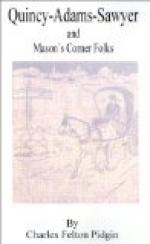“What do yer expect me to do with that head of lettuce?” asked Mrs. Hawkins with some asperity in her tone.
“Wall,” said Jonas, “I was over to Hill’s grocery and he’d ordered some from Bosting for Mis’ Putnam, but she’s too sick to eat ’em, so Sam gave me this one, ’cause we’re putty good customers, you know, and I kalkilated that if you made up one of them nice chicken salads o’ yourn it might please the new boarder and the old ones too;” and chuckling to himself he laid the lettuce on the kitchen table and walked out into the wood-shed. In a few moments he was vigorously at work chopping wood, whistling to himself as he worked.
“Mr. Hawkins is an awful good-natured man, isn’t he?” asked Betsy.
“Yes,” replied Mrs. Hawkins, “he’s too all-fired good-natured for his own good. If I’d known him twenty-five years ago he’d have money in the bank now. His fust wife wuz slacker’n dish water. But I guess we’ve talked enough for one mornin’, Betsy. You jest git that chicken I boiled and bone it and chop it up, and I’ll make the dressin’.”
When twelve o’clock sounded from the bell in the church tower, dinner was on the table at Mrs. Hawkins’s boarding house. By five minutes past twelve there were fourteen seated at the table, with one vacant chair. Professor Strout sat at the head of the table. At his left was Abner Stiles, while Robert Wood sat next to Stiles. The vacant seat was at the Professor’s right hand, and all eyes were turned toward it, for all had heard of the Boston man who had arrived the night before, but who, much to their disappointment, had not appeared at breakfast.
At ten minutes past twelve the door leading into the dining-room from the front entry was opened quietly, and the young man who entered, seeing the vacant chair near the head of the table, took possession of it.
For a moment nobody looked up, each apparently waiting for some one else to take the initiative.
Quincy, for it was he, broke the silence, and immediately every face at the table was turned towards him.
“How do you do, Professor?” said he. “Good afternoon, Mr. Stiles and Mr. Wood. Ah, glad to see you, Mr. Hill,” he added, as he espied Samuel Hill at the farther end of the table.
The Professor’s face grew crimson, then bright red, and finally assumed a bluish tinge. Abner sat transfixed. The others at the table had a charming diversity of expressions on their faces, ranging from “grave to gay, from lively to severe.” No one at the table enjoyed the situation any more than Samuel Hill, who was very fond of a joke and who knew of Quincy’s intention to meet his enemy at close quarters.
For several minutes no one spoke. Betsy flew from one to the other waiting upon table, but a solemn hush seemed to have fallen upon the dinner party. Again Quincy broke the silence.
“I trust, gentlemen,” said he, “that you will not let my presence interfere with your usual conversation. I have no doubt Mr. Stiles can tell us a good story, and I am equally sure that Professor Strout has some entertaining bit of village gossip that he would like to circulate.”




